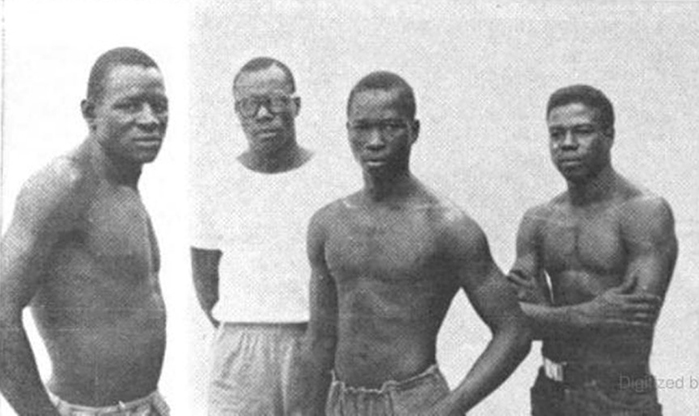Washington Kingsby (CSM Class of 1962)
CSM’s first Peace Corps volunteer
Olympic boxing coach, 1964
Santa Clara County juvenile probation officer
Born into a sharecropping family that fled economic and racial trauma in the South, Washington Kingsby ’62 grew up to be a guide to youth, a champion amateur boxer and coach, and an ambassador of democratic humanity both in the Bay Area and in west Africa, where he served as College of San Mateo’s first Peace Corps volunteer.
Kingsby (1938-2020) was part of the Peace Corps’ second cohort. The agency founded by Sargent Shriver, brother-in-law of then-President John F. Kennedy, aimed to assist developing nations. Its founding coincided with the independence of many former European colonies. Kennedy aimed to keep these new nations Western-aligned. Leaders of African nations wrote to Shriver, asking him to send athletic coaches.

“I had been thinking about joining the Peace Corps ever since it began,” Kingsby told the San Mateo Times in 1962. “I really wanted to do my part to help, but I felt that my skills didn’t fit any of the earlier projects. Then, at the end of August, I read about the need for trained athletes to teach in the Ivory Coast ... I applied, took my tests, and got a wire of acceptance.”
The CSM sophomore was a prominent amateur boxer, winner of the Northern California and San Diego Golden Gloves and AAU featherweight titles and, during a three-year stint in the Marines, coach of Camp Pendleton’s team. Then as now, the Peace Corps sought applicants who were already college graduates. But, as the Times noted, “Kingsby’s background matched perfectly the request of the young republic for someone to help convert its second most popular sport (after soccer) into international athletic prestige.”
Arriving in Abidjian, Ivory Coast, in February 1963 with four other Peace Corps coaches, Kingsby worked out twice daily with his boxers, at 6 in the morning and 4:30 in the afternoon.
“Before April, he had been invited home to dinner at least once with every one of them,” wrote fellow volunteer Bill Gunderson.
Their immediate target was the Friendship Games (precursor to today’s African Games), to be held that April in Dakar, Senegal, with teams from 25 countries.
In Dakar, Kingsby’s boxers won one gold, two silver and two bronze medals.
There, Kingsby also met 1960 U.S. Olympic champion Wilma Rudolph, brought to Dakar by the State Department. Two years later, at the 1964 Olympics, Kingsby would escort Rudolph into Tokyo’s Olympic stadium. The success of his Ivory Coast boxers prompted the Ivory Coast to keep him as coach of their national team.
His top boxer, light-heavyweight Fermin N’Guia, tied for ninth at the Tokyo games. In between, Kingsby graduated from San Jose State and pursued his longtime goal of becoming a juvenile probation officer.
Meanwhile, by 1964, 14 College of San Mateo alumni had become Peace Corps volunteers.
“The Peace Corps was the defining experience of my father’s life,” said Kingsby’s daughter, Jennifer Kingsby. “He made it very clear he was grateful for boxing. It gave him a way out. He saw a world he never would have had the opportunity to see, and experienced an intellectual and emotional growth. He relished traveling because of that. When he retired, he traveled back to Africa several times. He kept in touch with his boxers.”
Kingsby believed in athletics as a vehicle of character-building, of nation-building, and of diasporan and personal identity. Olympic sprinters and fellow SJSU alumni Tommie Smith and John Carlos, famous for their Black Power salutes on the 1968 Olympic podium, were frequent visitors to the Kingsbys’ San Jose home.
Kingsby retired from the Santa Clara County probation department in 1992. He moved seven years later to Atlanta, inspired by a visit to a fraternity brother (Kingsby helped found SJSU’s chapter of Omega Psi Phi) and, according to his daughter, by seeing “Black people doing cool things there.” He died in 2020.
Jennifer Kingsby laments that COVID-19 kept Kingsby’s loved ones from gathering to remember him in befitting fashion.
“Dad was reserved; he was giving; he was loving; he was classy. He was just a good guy. He was human.”
Interested in the Peace Corps? Learn more here.

